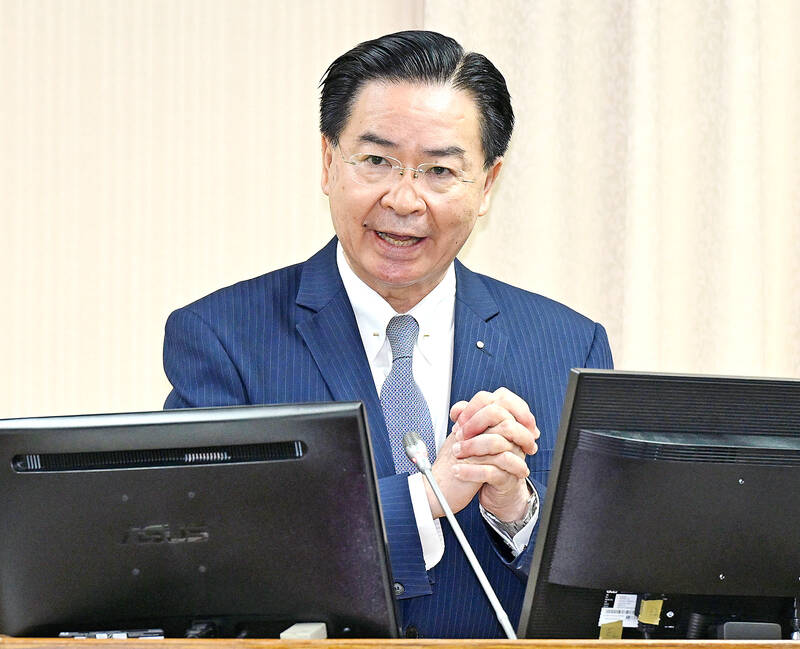Taiwan and the US have been looking at a piece of legislation that has guided their unofficial relations over the past 45 years, and they both think it is adequate for their current needs, Minister of Foreign Affairs Joseph Wu (吳釗燮) said on Thursday.
The 1979 Taiwan Relations Act (TRA) provides the US a legal basis to help Taiwan take part in international organizations and to supply Taiwan with weapons systems to boost its self-defense capabilities, Wu said during a legislative hearing, after an American academic called for a revision of the act.
The absence of official diplomatic relations between Taiwan and the US does not affect the application of US laws with regard to Taiwan, Wu said, citing Section 4 of the TRA.

Photo: Liao Chen-huei, Taipei Times
The act extensively covers almost all aspects of Taiwan and US interactions, and there is no need to revise it, he added.
“The key decisionmakers in Taiwan and the US” have agreed that the TRA already offers “adequate flexibility” for both sides and meets their current needs, Wu said in response to Democratic Progressive Party (DPP) Legislator Lo Mei-ling’s (羅美玲) question about whether the recent call for a law revision should be heeded.
The TRA only covers Taiwan proper and the Penghu archipelago, but should also include Kinmen and Lienchiang County, as well as the Taiwan-controlled Pratas Islands (Dongsha Islands, 東沙群島) and Itu Aba (Taiping Island, (太平島), US academic Miles Yu (余茂春) said during an April 13 seminar to commemorate the 45th anniversary of the TRA
Furthermore, the TRA uses the term “the people on Taiwan,” which would include any foreign visitor, so that should be revised to specify “the people of Taiwan” or “the Taiwanese people,” said Yu, who served as the China policy adviser to former US secretary of state Mike Pompeo.
However, US Assistant Secretary of State for East Asian and Pacific Affairs Daniel Kritenbrink on Tuesday said that the TRA serves as a “foundational element” for the US’ “one China” policy and that there is no need to change it.
“We have been able to engage in multiple initiatives and extensive cooperation with Taiwan, because the TRA provides the authorities [a basis] to carry out our unofficial relationship,” Kritenbrink said. “We have the framework we need. We do not need to change it. What we need is to respond to the present moment, using all the tools at our disposal.”
The TRA was enacted in April 1979, after the administration of then-US president Jimmy Carter switched diplomatic recognition from the Taiwan to China and has served as the legal framework guiding the US’ unofficial relations with Taiwan.

Chinese Nationalist Party (KMT) Chairman Eric Chu (朱立倫), spokeswoman Yang Chih-yu (楊智伃) and Legislator Hsieh Lung-chieh (謝龍介) would be summoned by police for questioning for leading an illegal assembly on Thursday evening last week, Minister of the Interior Liu Shyh-fang (劉世芳) said today. The three KMT officials led an assembly outside the Taipei City Prosecutors’ Office, a restricted area where public assembly is not allowed, protesting the questioning of several KMT staff and searches of KMT headquarters and offices in a recall petition forgery case. Chu, Yang and Hsieh are all suspected of contravening the Assembly and Parade Act (集會遊行法) by holding

PRAISE: Japanese visitor Takashi Kubota said the Taiwanese temple architecture images showcased in the AI Art Gallery were the most impressive displays he saw Taiwan does not have an official pavilion at the World Expo in Osaka, Japan, because of its diplomatic predicament, but the government-backed Tech World pavilion is drawing interest with its unique recreations of works by Taiwanese artists. The pavilion features an artificial intelligence (AI)-based art gallery showcasing works of famous Taiwanese artists from the Japanese colonial period using innovative technologies. Among its main simulated displays are Eastern gouache paintings by Chen Chin (陳進), Lin Yu-shan (林玉山) and Kuo Hsueh-hu (郭雪湖), who were the three young Taiwanese painters selected for the East Asian Painting exhibition in 1927. Gouache is a water-based

Taiwan would welcome the return of Honduras as a diplomatic ally if its next president decides to make such a move, Minister of Foreign Affairs Lin Chia-lung (林佳龍) said yesterday. “Of course, we would welcome Honduras if they want to restore diplomatic ties with Taiwan after their elections,” Lin said at a meeting of the legislature’s Foreign Affairs and National Defense Committee, when asked to comment on statements made by two of the three Honduran presidential candidates during the presidential campaign in the Central American country. Taiwan is paying close attention to the region as a whole in the wake of a

OFF-TARGET: More than 30,000 participants were expected to take part in the Games next month, but only 6,550 foreign and 19,400 Taiwanese athletes have registered Taipei city councilors yesterday blasted the organizers of next month’s World Masters Games over sudden timetable and venue changes, which they said have caused thousands of participants to back out of the international sporting event, among other organizational issues. They also cited visa delays and political interference by China as reasons many foreign athletes are requesting refunds for the event, to be held from May 17 to 30. Jointly organized by the Taipei and New Taipei City governments, the games have been rocked by numerous controversies since preparations began in 2020. Taipei City Councilor Lin Yen-feng (林延鳳) said yesterday that new measures by